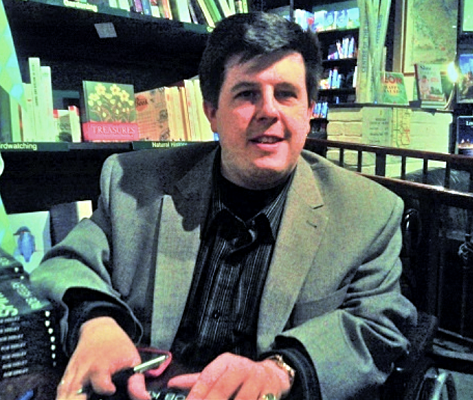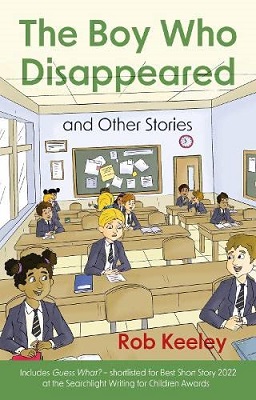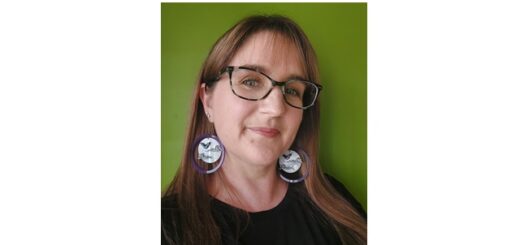Interview with Author Rob Keeley
Rob Keeley
I am thrilled to have interviewed author Rob Keeley, who shared with us details of his writing life, his book ‘The Boy Who Disappeared and Other Stories‘, which was released on 28th March 2023, and answered a few fun questions. This post contains affiliate links.

Rob Keeley was born in Wirral, Merseyside, UK. Writing his first story aged seven, his first short play aged eleven and first being published at fifteen, he wrote for several magazines before his first book for children, The Alien in the Garage and Other Stories, was published in 2011. He then wrote two more collections of children’s stories, one of which, The Dinner Club and Other Stories, was longlisted for the International Rubery Book Award.
Rob has now published all five novels in his Spirits series, the first of which, Childish Spirits, gained him a Distinction for his MA in Creative Writing before being longlisted for the Bath Children’s Novel Award and nominated for the People’s Book Prize in 2015. The second novel in the series, The Spirit of London, was highly commended for the Independent Author Book Awards in 2016 before book four, High Spirits, won at the succeeding Georgina Hawtrey-Woore Awards in 2018.
He has published a standalone children’s novel (The Treasure in the Tower) and two picture books for young children. In 2022 his first novel for adults Death At Friar’s Inn was e-published. He has also written a stage play Mr Everyone and has BBC writing experience with Chain Gang and Newsjack for Radio 4 Extra.
Rob has studied Screenwriting and Filmmaking, has been a judge for the IGGY and Litro Young Writers’ Prize and is a supporter of the Children’s Media Foundation. His books have been used in schools, libraries and at literary festivals and he is in demand for his author
workshops, which one teacher even described as “inspirational”! During lockdown he was Children’s Writer in Residence at the Stay at Home Literary Festival.
Most recently, he has been seen at the Wirral Arts Festival and World Book Day events. His latest short story collection for children, The Boy Who Disappeared and Other Stories, was published in March 2023.
1) Where did the inspiration for your book come from?
I had wanted to do another short story collection for children ever since the success of The Dinner Club and Other Stories, which incredibly was published ten years ago, back in 2013! I’ve been doing children’s novels, picture books and a novel for adults since then. I know from school and library workshops, as well as The Dinner Club’s longlisting for the International Rubery Book Award, that it’s a successful formula. In an increasingly busy world and with school and family timetables so full, the quick, easy but fulfilling read has become very popular again and I see teachers and parents saying so online. It’s funny, when I was told for years by the publishing industry that short stories for children don’t sell!
My new book, The Boy Who Disappeared and Other Stories, contains eleven new tales written from 2017 onwards alongside my other projects,
including some during lockdown. Inspiration came from a wide variety of sources. To give you some examples, ‘The Boy Who Disappeared’ is set in 2020 and was inspired by school closures during COVID, while ‘The Arms Race’ came out of news articles I had read about schools who ban hugging. ‘Guess What?’ was shortlisted last year for Best Short Story at the Searchlight Writing for Children Awards, so that was a must for inclusion.
The book contains both primary and secondary school stories and the latter half of the book contains stories about the move from one to the other, something I found very traumatic as a child, so there were lots of memories to use there. Finally, I wanted to end on a positive note with a Christmas story, so we close with ‘A Present from Owen’.
2) How did you plan out the plot?
Largely in my head and straight onto the screen, with only occasional notes by hand or on computer.
3) When did you choose the title for your book?
With a short story collection, I use the title of the opening story as the primary title for the book. ‘The Boy Who Disappeared’ is a good, arresting title and also led to a fine cover illustration by my regular illustrator Simon Goodway. I decided very early on that this would be the title story.
4) How did you come up with the names for your characters?
Sometimes they’re names I’ve actually heard in life; sometimes I look at books of first names or (when creating child characters) the lists of most popular baby names for that year. But often, it’s just what sounds or feels right for the character. You have to bear in mind that children’s stories will often be read aloud, so the sound of the name is very important – a good character should sound reassuring, a bad guy’s name should sound unnerving.
With a group of characters, you want clearly contrasting, identifiable names. In these days of inclusivity there’s also an expectation that names reflecting different ethnic and cultural backgrounds will be included. Most of the stories in the book are school stories and you want them to reflect real schools of today.
5) Can you give us a hint to any sections that you removed?
I can’t remember any major cuts to The Boy Who Disappeared and Other Stories. The version of ‘Guess What?’ included is actually slightly longer than that which won the award, because of competition word limits. So readers are getting a bonus!
6) What made you choose this genre?
I’d enjoyed writing school stories in my first three books (The Alien in the Garage, The (Fairly) Magic Show and The Dinner Club) and wanted to return to that format and to the fictional primary school I created. I also wanted to include secondary school stories for the first time.
7) How long did it take you to complete your book?
As mentioned above, the book has been gradually in the making since 2017. It entered production in autumn 2022 and was published on 28
March 2023.
8) Can you describe your book in three words?
Funny, unpredictable, accessible.
9) What’s the hardest part of being a writer?
Proofreading. You stop enjoying reading the stories as stories, and instead have to look at every letter, every number, every full stop, every line break… But it’s an important stage in publication, because you want the finished book to be perfect. You don’t want to see a mistake staring at you from the shelves!
10) Why should our readers pick your book up?
It’s a fun, varied collection of short stories, to which most 8-12-year-olds should be able to relate; accessible even to reluctant readers; and entertaining while also considering certain contemporary issues such as loneliness, the need for friendship, social agendas in schools, mental health and the move to secondary school.
and Other Stories
Publisher – Matador
Release Date – 28th March 2023
Pages – 208
ISBN 13 – 978-1803136448
Format – ebook, paperback
Synopsis
Ellis is annoying Isla… but suddenly he isn’t there…
Oscar’s written what he thinks about everyone… and left the paper in a library book…
Fletcher becomes a hero to Suzie… Tessa takes action when her school bans hugging…
Holly Class wind up Pine Class on Transition Day…
Paul really doesn’t want to go to big school…
Myra hates her new school… until she meets Shane…
And more…
A brand-new collection of short stories from award-winning children’s and YA author Rob Keeley.
Includes Guess What? – shortlisted for Best Short Story 2022 at the Searchlight Writing for Children Awards – and two new Liam and Justin stories. Suitable for the 8-12s, and with primary and secondary school stories, this collection is fast, funny and packed with twists and turns.
Purchase Online:
Fun Questions

1) Do you have a writing buddy (i.e. a pet)?
Sorry, no – writing is a fun but very solitary process for me. I do still sometimes feel that Edward, the Victorian boy ghost from my Spirits novels, is standing beside me, looking over my shoulder as I type. He wants to be in another book, I think. Sadly I can’t supply a picture of him, as he probably wouldn’t show up in a photo even if he’d stay visible for long enough.
2) Do you have any writing quirks?
I still work very much like an office day. I like to start as early as possible and get 60-90 minutes’ work in before breakfast, with further breaks for coffee and lunch. As a Christian, I also say a quick prayer before I start to write.
3) Where do you write?
At my desk, upstairs in my little home office. Sorry I can’t give a more exciting answer! I’ve no writing shed or café to talk about.
4) Your book has been made into a movie, you’ve been offered a cameo role, what will you be doing?
Making sandwiches for the crew.
5) A talking owl has just finished reading your book, what’s the first thing he says to you?
‘I couldn’t put it down. It kept me up all day.’
Author links
Goodreads
Website
A big thank you to Rob Keeley for sharing his writing life with us and for a wonderful interview.






